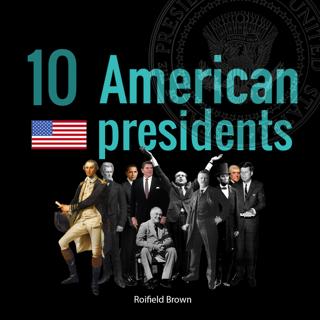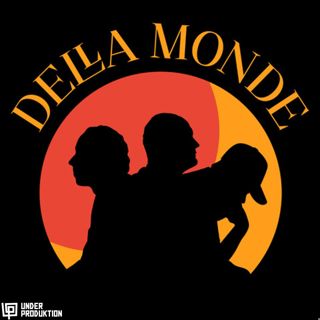
Ep: 16 Theodore Roosevelt - David Pietrusza
Theodore Roosevelt Jr. (October 27, 1858 – January 6, 1919) was an American statesman and writer who served as the 26th President of the United States from 1901 to 1909. He also served as the 25th Vice President of the United States from March to September 1901 and as the 33rd Governor of New York from 1899 to 1900. As a leader of the Republican Party during this time, he became a driving force for the Progressive Era in the United States in the early 20th century. His face is depicted on Mount Rushmore, alongside those of George Washington, Thomas Jefferson, and Abraham Lincoln. Hosted on Acast. See acast.com/privacy for more information.
19 Feb 20181h 58min

Ep: 15 - A loyal subject, Roifield hosts The Thomas Jefferson Hour
Roifield Brown hosts the Thomas Jefferson show and questions President Thomas Jefferson (as portrayed by humanities scholar Clay S. Jenkinson) about the failure of America to realize Jefferson's vision. Hosted on Acast. See acast.com/privacy for more information.
31 Jan 20181h 1min

Ep: 14 - The Election of 1800 - Vonnahme & Martin
The United States presidential election of 1800 was the fourth quadrennial presidential election. It was held from Friday, October 31 to Wednesday, December 3, 1800. In what is sometimes referred to as the "Revolution of 1800", Vice President Thomas Jefferson defeated President John Adams. The election was a realigning election that ushered in a generation of Democratic-Republican Party rule and the eventual demise of the Federalist Party in the First Party System. Also thanks to narrators Diane Telford, Lonny Behar, Thomas Daly, Keith F. Shovlin and Zanna Ace Hosted on Acast. See acast.com/privacy for more information.
31 Okt 20171h 16min

Special - Dave Smith and how you become president of the United States
Always be there is a searing track on Remedy the debut studio album by the English electronic music duo Basement Jaxx which was released in 1999Number one for six consecutive weeks on the Billboard Hot 100 chart "Call Me" is a song by the American new wave band Blondie and the theme to the 1980 film American Gigolo. "Crying Over, reached #11 on the UK Singles charts in 1974 and was featured on the seventh studio album by Jamaican recording artist Ken Boothe. Hosted on Acast. See acast.com/privacy for more information.
12 Juni 201730min

Ep: 13 - Grant - Adam Vonnahme
Ulysses S. Grant (born Hiram Ulysses Grant; April 27, 1822 – July 23, 1885) was the 18th President of the United States (1869–77).As Commanding General (1864–69), Grant worked closely with President Abraham Lincoln to lead the Union Army to victory over the Confederacy in the American Civil War. He implemented Congressional Reconstruction, often at odds with President Andrew Johnson. Twice elected president, Grant led the Republicans in their effort to remove the vestiges of Confederate nationalism and slavery, protect African American citizenship, and support economic prosperity. His presidency has often been criticized for tolerating corruption and for the severe economic depression in his second term.h Hosted on Acast. See acast.com/privacy for more information.
31 Mars 20172h 6min

Ep:12 The United States presidential election of 1948 - David Pietrusza and Adam Vonnahme
The United States presidential election of 1948 was the 41st quadrennial presidential election, held on Tuesday, November 2, 1948. Incumbent President Harry S. Truman, the Democratic nominee, who had succeeded to the presidency after the death of President Franklin D. Roosevelt in 1945, successfully ran for election for a full term against Thomas E. Dewey, the Republican nominee.The election is considered to be the greatest election upset in American history. Virtually every prediction (with or without public opinion polls) indicated that Truman would be defeated by Dewey. The Democratic Party had a severe three-way ideological split, with both the far left and far right of the Party running third-party campaigns. Truman's surprise victory was the fifth consecutive presidential win for the Democratic Party, the longest winning streak in the history of the party, and second-longest in the history of both modern parties (surpassed only by the Republicans' six consecutive victories from 1860 to 1880). With simultaneous success in the 1948 congressional elections, the Democrats regained control of both houses of Congress, which they had lost in 1946. Truman's feisty campaign style energised his base of traditional Democrats, consisting of most of the white South, as well as Catholic and Jewish voters; he also surprisingly fared well with Midwestern farmers. Thus, Truman's election confirmed the Democratic Party's status as the nation's majority party. Hosted on Acast. See acast.com/privacy for more information.
23 Juli 20161h 51min

Ep:11 The Presidents Speech - Kevin Stroud - The History of English
Kevin Stroud from The History of English Podcast looks at the development of American English and how its presidents have helped its development.Benjamin Franklin, George Washington, John Adams, Thomas Jefferson, Abraham Lincoln, Teddy Roosevelt, William Howard Taft, Franklin Roosevelt, FDR, John F Kennedy, JFK, Lyndon Johnson, LBJ and George W Bush.10 American Presidents is part of the Agora Podcast Network Hosted on Acast. See acast.com/privacy for more information.
25 Juni 201658min





















